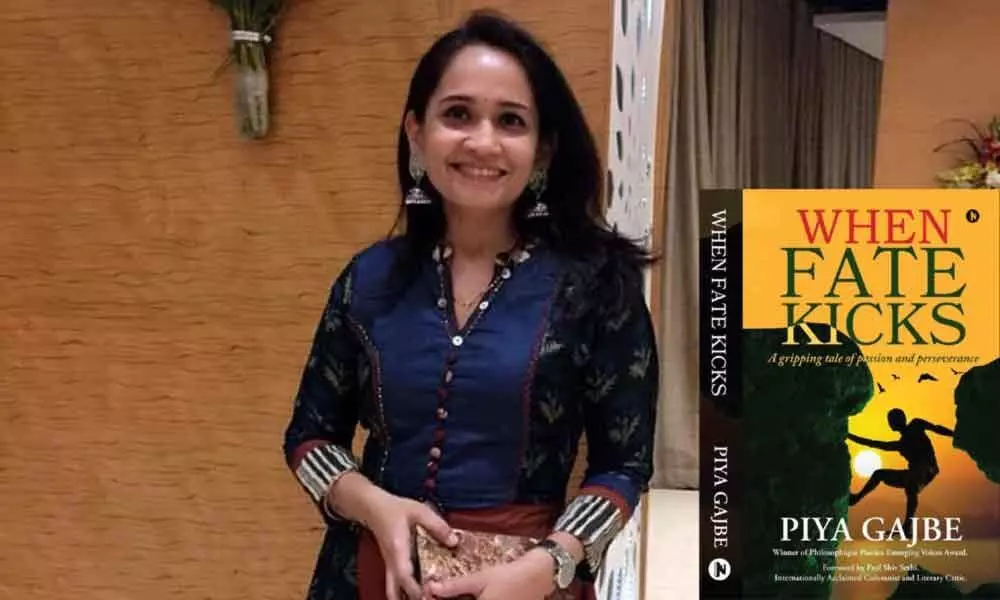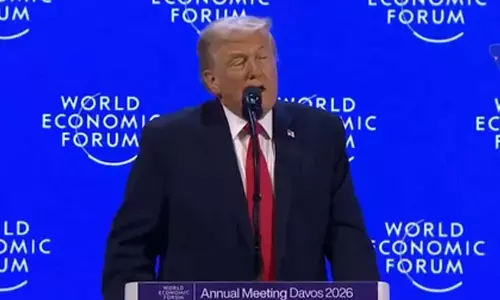A kicking tale of colossal courage

Adovocate-turned-author Piya Gajbe weaves an enthralling tale…
With the launch of her novel 'When Fate Kicks', the author Piya Gajbe has created ripples in the realm of Indian Literature in English. There is no denying the fact that since his inception man has been grappling horns with the mighty forces of fate. In his headlong collision with fate, many a time man emerges victorious and succeeds in altering the course of destiny but on other occasions, it is the destiny that thwarts the design of a man and brings him down from prosperity to adversity.
Conflict to which Christopher Marlowe refers as the essence of drama has been artistically dramatised and depicted by the author in this exquisitely mesmerising book. On the surface level, the narrative revolves around the life of its chief protagonist Gautam, who aspires to become an inimitably great footballer. But the climax of the book builds up when this adroit kicker is unfortunately kicked by the gigantic foot of fate. An ordinary occurrence brings extraordinary consequences in its wake which derails his life. All of his hopes are dashed to the ground. This is the most intense moment in the novel and the readers excitedly flip through the pages to explore what lies ahead in store for their amiable and introvert hero. Here two simultaneous battles begin. One is being fought by Gautam against the exterior adverse circumstances and the other is raging in his mindscape. Someone has rightly said that prosperity brings friends and adversity tests them.
Barring a few loyalists, most of the friends fail in this litmus test of friendship and leave the beleaguered protagonist alone. Gajbe seems more convinced with the writing canons of William Shakespeare as she meticulously stitches the plot with the threads of both inner and outer conflict.
Unlike Shakespeare, Marlowian plots primarily hinge upon the interior conflict. But 'When Fate Kicks' is a consummate blend of both the varieties of conflict. The success of the author lies in the deft usage of symbolism. It is not the story only which contains connotative meaning, most of the lexical items too have symbolic implications. The adroit deployment of appropriate words and phrases like sentinels on the most appropriate places makes the fact evident that the author is well conversant with the queen's tongue.
The language is classy but not highfalutin. The sprinkling of vernacular here and there (Bengali) intensifies the charms of the work. Sentences have been created like musical notes that are a sumptuous feast to our auditory senses. When it comes to the art of characterisations, most of Gajbe's characters are round. They evolve and grow as the narrative moves forward. Life has many lessons to teach us and it excellently educates us. Therefore, Gautam gains enormously from the university of life and does not succumb to the nefarious manipulations of fate.
To further highlight the indomitable spirit of this man, the analogy of a mythical bird Phoenix can be drawn. Like the mythical bird, this real-life character rises from his own ashes and proves the dictum right that man is the architect of his own fate. Keeping in view the three unities in literature as essential (The concept expounded by Aristotle in his magnum opus 'Poetics') the unities of time, place and action have been skillfully maintained and adhered to. While reading the book, the readers do not encounter any distractions and digressions, which testify that the plot of the novel is a well-knit unit without any loose ends.
It is a must-read book for all the classes of readers. Journeying with an ambitious boy and exploring what happens when fate kicks a kicker is indeed going to be a worth cherishing and thrilling experience.














